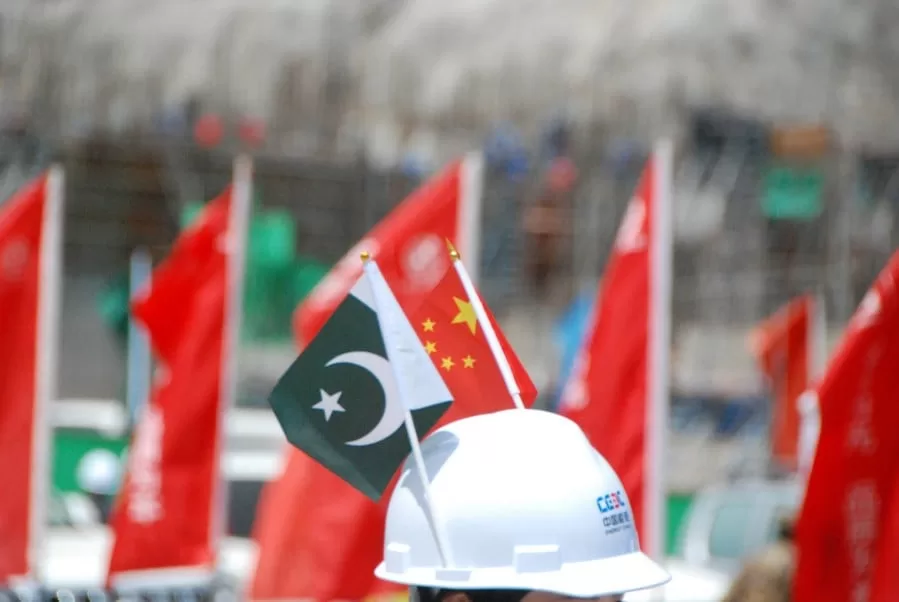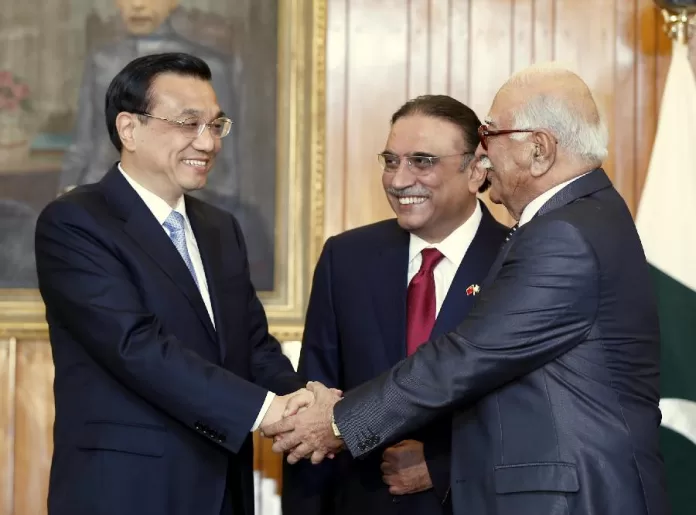“China and Pakistan have shaped a paradigm of neighbour-to-neighbour relations. Their time-tested friendship, described by some as “higher than the mountains and deeper than the oceans,” is not just a bunch of empty words,” a commentary in the state-run Xinhua news agency said as Premier Li Keqiang began his short visit to Pakistan on Wednesday, May 22. It added that despite differences in ideology, religion, culture and social system, the bilateral ties have withstood various tests and vicissitudes of international situations. Truer words have never been spoken. More than sixty years ago Pakistan and China established diplomatic relationships, since then their ties have prospered to become exemplary; growing stronger with time. The region has undergone numerous geo-strategic changes e Sino-Indo relations, collapse of the Soviet Union, the 9/11 tragedy, Pakistan becoming a front line state in the war against terror, etc. In the context to all these developments, China and Pakistan have been on the same page, each supporting the other at every forum and exhibiting an exemplary and unique bond, rarely found in nations today. The intensity of their relationship can be gauged by the frequency of visits by the two heads of the state which continue till today – the first Chinese ambassador came to Pakistan in September 1951 and Pakistan’s first ambassador went to Peking on November 1, 1951.
China’s success story is a unique example as it has risen peacefully solely through the use of its soft power rather than the deployment of hard power, in marked contrast to the historical norm in most other cases. Pakistan-China relations have, slowly but surely, become more broad-based and have developed greater depth with strategic dimensions; these are no longer confined to diplomacy and defence but include economy, energy, culture, education and counter-terror cooperation. China has become Pakistan’s biggest trading partner, largest exporter and among the top 5 importers. Pakistan and China have always enjoyed a multi-dimensional relationship and because of the strategic location of Pakistan it has served as a bridge between China and the Middle East as well as for Sino-US rapprochement. For the benefit of readers I am reproducing my article “CHINA-PAKISTAN TIES”.
Visiting China is a never-ending revelation, the amazing 7.7% growth rate in a sluggish global economy is considered “disappointing”. Of China’s 31 provinces, Guangdong has the highest GDP – US$960 billion with a growth rate of 8.2% while Tibet is lowest with 12% growth rate and a GDP of US$11 billion. Guizhou province has the highest growth rate 12%, bordering Pakistan and vastly underdeveloped Xinjiang is 25th with US$121 billion and a 12% growth rate. The expanse of the two bustling ever-growing mega cities of Beijing or Shanghai, not counting the two dozen cities or more well on their way to becoming, is truly outstanding with enormous public infrastructure delivering efficient services to its citizens.
An early morning (7:15 am) extempore briefing by CH Tung at the EastWest Institute (EWI) 2013 “spring” Board Meeting in Beijing from May 15 to May 17 was a treat. The shipping magnate became Hong Kong’s Chief Executive in 1999 when the city was handed back to China by the UK. Born on July 8, 1937, the day Japan and China went to war, “CH” gave an insightful historical and cultural perspective into China describing the determined mindset influencing China’s drive to soon become the most prosperous country in the world.
Certainly important to peace and prosperity in the world, the US-China competition is presently peaceful but has ominous military overtones because of the growing number of flashpoints on China’s periphery. The US is mired in “Cold War” relationships that it cannot seem to shed. What is of greater concern to us is Pakistan’s present and future ties with China. China’s only opening to the world was symbolised best by Pakistan’s facilitating China’s first top-level contact with the US Henry Kissinger’s famous secret trip to China in July 1971 changed the strategic dynamics of the world. Chinese PM Chou En-Lai reportedly told Kissinger, “Do not forget the bridge (meaning Pakistan) you have used, you may have to use it again.” Unfortunately our record with the US is spotty, every ten years or so Pakistan goes from being a ‘cornerstone’ to a ‘gravestone’.
The Chinese leaders of the 70s are octogenarians now, and retired, However, China has not forgotten the “bridge” that Pakistan is, at least at the strategic level. The proposed Pak-China economic corridor linking Gwadar Port with Xinjiang and other parts of China will involve both road and rail links, with both optic fibre and oil pipelines for boosting energy, trade and transport between the two countries. Initially investing over US$20 billion creating a ‘Special Economic Zone’ in Xinjiang Province, China’s keenness to have another trade outlet to the Indian Ocean is cementing its historic ties with Pakistan. From weeks and months the transit time will come down to three to four days only creating an economic windfall for Pakistan, particularly in less developed Balochistan, Pakistan’s salvation requires major investment in the infrastructure. With the US pulling out of Afghanistan by 2014, the Afghan economy will go into a tailspin. Only an economic overdrive can contain the spillover of the desperate poverty and want complicated by armed conflict within Afghanistan. Militarily we will be hard-pressed, force-multiplied further if we fail to create economic opportunities for our people and the Afghans adjacent to our borders.
The high point of my current visit to China was meeting up with retired ambassador Zhang Chun Xiang. Four decades ago he was an interpreter with the People’s Liberation Army (PLA) divisions constructing the tremendous Karakoram Highway (KKH) in the highest mountains in the world. Pakistan Army Aviation’s KKH Flight was in support with two Aloutte-3 helicopters. Ambassador Zhang speaks fluent Urdu and is not averse to choice Punjabi expletives if and when the need arises. He served as the Chinese consul general in Houston, retiring as China’s ambassador to Hungary. His 23 years of service in Pakistan includes stints with the Chinese consulate general in Karachi and the Chinese embassy in Islamabad. His last posting in Pakistan was as ambassador. Now in an advisory capacity with major Chinese technological group Huawei, Zhang still advises on Chinese policies in South Asia.

EWI honoured Ambassador Zhang by his brief presence at the EWI Board meeting. Outstanding People like Zhang have kept the friendship alive not only between individuals but countries, our mutual association being highly symbolic of the continuing friendship between China and Pakistan. Emotions and feelings will always drive relationships between China and Pakistan. Emotions and feelings will always drive the relationships between nations, more importantly core interests must coincide. Better still, they should not diverge.
The disappointment in Pakistan that Chinese PM Li Keqiang chose India as his first stop as prime minister (with Islamabad to follow later) is more perception than fact. We should not be apprehensive of China-India bonds, it will have no negative consequences for Pakistan. Similarly we cannot condition our ties with the US with their ties with India, the dynamics are different particularly given the economic connotations. Our ties with China will become stronger as mutual economic initiatives increasingly dovetail into their geo-political compulsions. Take India’s questioning of the Chinese policy of issuing stapled visas to residents of Indian-occupied Kashmir in contrast to giving normal visas to citizens of the Pakistan-administered side, India says China is taking Pakistan’s side in the dispute. That is true!
India’s trade with China exceeds US$66 billion but unresolved border disputes remain. Historically China is a restraining factor to India’s normal aggressive posture vis-à-vis Pakistan. India’s apprehensions about Gwadar are neither justified nor warranted. The Chinese PM will possibly underscore the port’s importance to China, not as a forward military base but an energy and trade junction providing a vital economic outlet for China. Regional peace and stability requires we address contentious issues between India and Pakistan like Kashmir that bedevil relations. Given that we can never come to an agreement over Kashmir, what is stopping us from coming to an arrangement?
To quote Director Sun Shi-Lai of the Chinese Academy of Social Sciences “Pakistan can cast great influence on Islamic countries and serve as a bridge between China and the Middle East.” Fortunately China’s self-interest and our national interest coincide, this reinforcing mutual commitment as “all-weather” friends (to quote Chinese FM Wang Yi). Our friendship is definitely a ‘cornerstone’ of Chinese foreign policy. With over US$20 billion being invested in Xinjiang this year alone, China’s opening to the Indian Ocean is not only a dream of prosperity for China and Pakistan but a dire necessity.
The Chinese suffered many casualties during the construction of the KKH. As helicopter pilots it was our unpleasant duty to ferry the injured for medical aid, some of them were serious, many were fatal. For me personally at that time it was a road to nowhere and coming from nowhere. The proximity to blood and gore on a daily basis does get to you, after one particularly harrowing day I angrily asked Zhang, “What is with you Chinese, Why are you killing yourselves for this road?” His calm reply is forever etched in my memory, “You Pakistanis cannot think beyond 10 years, we Chinese dream beyond a 100 years!”
What stops us Pakistanis from dreaming too?




